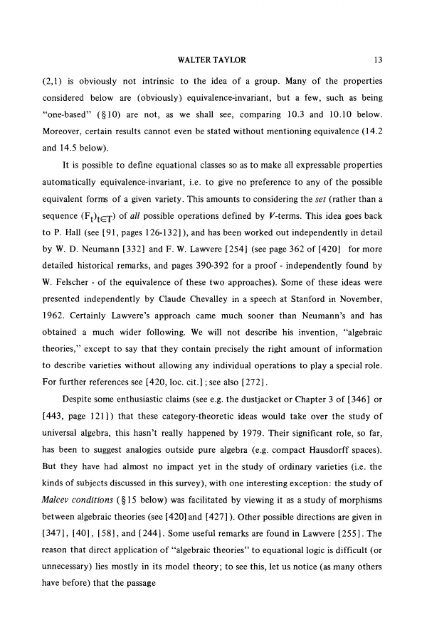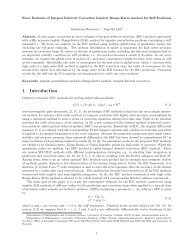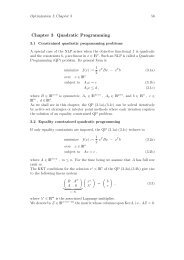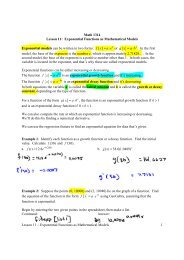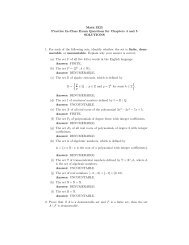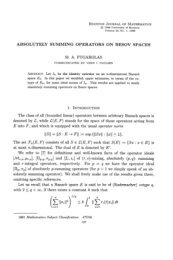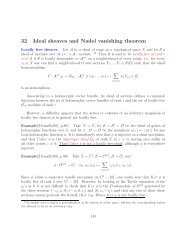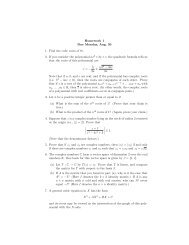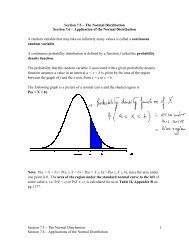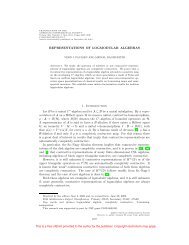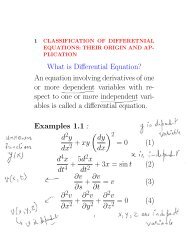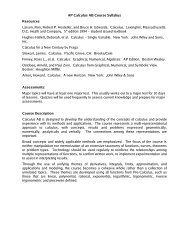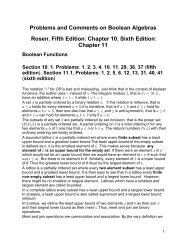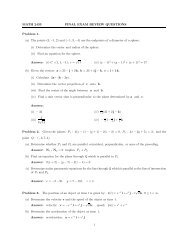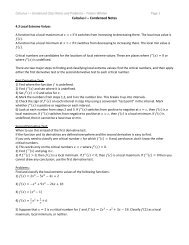Survey 1979: Equational Logic - Department of Mathematics ...
Survey 1979: Equational Logic - Department of Mathematics ...
Survey 1979: Equational Logic - Department of Mathematics ...
You also want an ePaper? Increase the reach of your titles
YUMPU automatically turns print PDFs into web optimized ePapers that Google loves.
WALTER TAYLOR 13<br />
(2,1) is obviously not intrinsic to the idea <strong>of</strong> a group. Many <strong>of</strong> the properties<br />
considered below are (obviously) equivalence-invariant, but a few, such as being<br />
"one-based" (õ10) are not, as we shall see, comparing 10.3 and 10.10 below.<br />
Moreover, certain results cannot even be stated without mentioning equivalence (14.2<br />
and 14.5 below).<br />
It is possible to define equational classes so as to make all expressable properties<br />
automatically equivalence-invariant, i.e. to give no preference to any <strong>of</strong> the possible<br />
equivalent forms <strong>of</strong> a given variety. This amounts to considering the set (rather than a<br />
sequence (Ft)tCT) <strong>of</strong> all possible operations defined by V-terms. This idea goes back<br />
to P. Hall (see [91, pages 126-132] ), and has been worked out independently in detail<br />
by W. D. Neumann [332] and F. W. Lawvere [254] (see page 362 <strong>of</strong> [420] for more<br />
detailed historical remarks, and pages 390-392 for a pro<strong>of</strong>- independently found by<br />
W. Felscher - <strong>of</strong> the equivalence <strong>of</strong> these two approaches). Some <strong>of</strong> these ideas were<br />
presented independently by Claude Chevalley in a speech at Stanford in November,<br />
1962. Certainly Lawvere's approach came much sooner than Neumann's and has<br />
obtained a much wider following. We will not describe his invention, "algebraic<br />
theories," except to say that they contain precisely the right amount <strong>of</strong> information<br />
to describe varieties without allowing any individual operations to play a special role.<br />
For further references see [420, loc. cit.]; see also [272].<br />
Despite some enthusiastic claims (see e.g. the dustjacket or Chapter 3 <strong>of</strong> [346] or<br />
[443, page 121]) that these category-theoretic ideas would take over the study <strong>of</strong><br />
universal algebra, this hasn't really happened by <strong>1979</strong>. Their significant role, so far,<br />
has been to suggest analogies outside pure algebra (e.g. compact Hausdorff spaces).<br />
But they have had almost no impact yet in the study <strong>of</strong> ordinary varieties (i.e. the<br />
kinds <strong>of</strong> subjects discussed in this survey), with one interesting exception: the study <strong>of</strong><br />
Malcev conditions (õ 15 below) was facilitated by viewing it as a study <strong>of</strong> morphisms<br />
between algebraic theories (see [420] and [427] ). Other possible directions are given in<br />
[347], [40], [58], and [244]. Some useful remarks are found in Lawvere [255]. The<br />
reason that direct application <strong>of</strong> "algebraic theories" to equational logic is difficult (or<br />
unnecessary) lies mostly in its model theory; to see this, let us notice (as many others<br />
have before) that the passage


